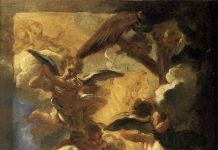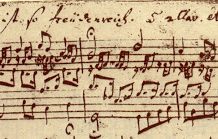The most marked political tendency of the American people has been to interpret their government as a pure and simple democracy, and to shift it from a territorial to a purely popular basis … to change their constitution from a republican to a despotic, or from a civilized to a barbaric constitution.
Thus begins chapter 14 of Orestes Brownson’s remarkably insightful classic, The American Republic: Constitution, Tendencies, and Destiny (1866). Brownson’s first major point is that there are two kinds of democracy: (1) the kind that is rooted in individual freedom, the right to live one’s life as one sees fit, and to vote for a government that affirms that right; and (2) the kind that depends on groups of people who, banding together, can assert their will upon the world. The first kind gives to individuals the right to create the government that will rule them according to the will of the majority. The second kind, up until the recent Civil War, had given the states of the South the right to band together and impose their will upon slaves powerless to resist. Both ways of thinking are based upon the possession of power to freely impose one’s will upon others. But southern slavery is based upon a corrupt and exclusive notion of freedom, since egoistic slaveholders preach “freedom for me but not for thee.” The Civil War was fought to end that kind of democracy, and to align the United States with the democracy of other nations of the West who were in compact with the Christian idea of human equality. International law was traditionally rooted in this Christian idea, thus enabling a more or less Christian “solidarity of nations.”
The Humanitarian Scam
On the other hand, democracy in the North in Brownson’s time had already acquired a so-called “humanitarian” thirst for socialism. This thirst could only be quenched if individual freedoms were overcome by a rather different kind of slavery, the imposition of the socialist state upon the masses. For Brownson, the socialist
… sees humanity superior to individuals, superior to states, governments, and laws, and holds that he may trample on them all or give them to the winds at the call of humanity or ‘the higher law.’ The principle on which he acts is as indefensible as the personal or egoistical democracy of the slaveholders and their sympathizers. Were his socialistic tendency to become exclusive and realized, it would found in the name of humanity a complete social despotism, which, proving impracticable from its very generality, would break up in anarchy, in which might makes right, as in the slaveholder’s democracy.
In effect, the humanitarian abolitionists of the Civil War era, after the cause of abolishing slavery was achieved, became the humanitarian socialists of the post Civil war period. The abolitionists and the socialists were both of the same stripe, eager to use all force necessary to change the World Order in the name of humanity.
Those in the South who believed in the sort of democracy that gave them the right to subdue others in slavery were defeated by those in the North who wished to keep the nation one and undivided. While Europe perceived the Civil War to be a war against slavery, Americans in both the North and South, consciously or unconsciously, believed they were fighting either to destroy or preserve the national unity designed by the Founders under the Constitution. The humanitarian abolitionists morphed into the humanitarian socialists as soon as slavery and the war ended, as Brownson observes:
The humanitarians are more dangerous in principle than the egoists [slave holders], for they have the appearance of building on a broader and deeper foundation, of being more Christian, more philosophic, more generous and philanthropic; but Satan is never more successful than under the guise of an angel of light. His favorite guise in modern times is that of philanthropy. He is a genuine humanitarian, and aims to persuade the world that humanitarianism is Christianity, and that man is God; that the soft and charming sentiment of philanthropy is real Christian charity; and he dupes both individuals and nations, and makes them do his work, when they believe they are earnestly and most successfully doing the work of God…. Having obliterated all distinction of sex in politics, in social, industrial, and domestic arrangements, he must go farther, and agitate for equality of property. But since property, if recognized at all, will be unequally acquired and distributed, he must go farther still, and agitate for the total abolition of property, as an injustice, a grievous wrong, a theft.
Brownson recognized in the victory of the North over the South a certain delusion developing among the humanitarian socialists, who saw the triumph over slavery as the first step in the march toward an overhaul of Western Civilization toward complete “philanthropic” control of the people by the central government. But this premature celebration of victory by the socialists in America and Europe, Brownson insisted, would soon be shown for the delusion it was when the states of the South were reconstructed, and, following the rights granted them by the Constitution, would push back against this socialist totalitarian threat to the freedom of all Americans. If the reign of barbaric slavery in the South had ended, a new barbaric reign of national socialism would not be allowed to take its place. As Brownson reminds us, “The Constitution, in the distribution of the powers of government, provides the States severally with ample means to protect their individuality against the centralizing tendency of the General government, however strong it may be.”
Somewhat optimistic, Brownson was convinced that the states of the South would soon assert their power individually and collectively against the newly won expanded wartime powers of the Federal government that had granted dictatorial powers to the Union President. Brownson cautioned, for example, that it would be wise to lengthen a President’s term of office, yet make him ineligible for a second term, thereby limiting the mischief he might otherwise accomplish. (The policy of term limits was heeded by Congress after World War II following the death of Franklin Delano Roosevelt, who was on a path to serve four consecutive terms when he died in the first year of his fourth term.)
Brownson believed that philanthropic socialism would never take hold in the agrarian South because farmers, hard working and self-reliant, would never be duped by socialist dreamers. Likewise, in the North where money and property ruled the day, socialism would not be accepted. As he so deftly put it:
The men of wealth, the business men, manufacturers and merchants, bankers and brokers, are the men who exert the worst influence on government in every country, for they always strive to use it as an instrument of advancing their own private interests…. They act on the maxim, “Let government take care of the rich, and the rich will take care of the poor.”
But of course this is not the agenda of the philanthropic socialists. They wish, by their policies and the cynical leveraging of all the powers of government, to “take care of” the rich, the middle class, and the poor. And so it is this that makes them not the power of light, but of darkness over the land, because they grasp for a totalitarian power that should not be in the possession of any single person or party.
Political and Religious Destiny
Before speaking of the political and religious destiny of the American Republic, Brownson reminds us of the origins of the American system. Tracing the evolution of republics from Roman to modern times, he documents that at first republicanism was less democratic than it was later to become under the emperors. Its initial form gave dominant power to the nobles, the rich, and produced slavery as a common form of treatment for those who had been conquered in wars, since to have executed conquered, soldiers, if they had laid down their arms in surrender, was considered unnatural. Over the period of the next few centuries, under the influence of Christianity, slavery in Europe was gradually abandoned. After the French Revolution, political suffrage enlarged gradually among the middle class, yet the full realization of a republic was hampered by the advent of the imperial emperor Napoleon, who imagined himself the resurrection of some ancient Caesar.
Next Brownson invokes the model of the Trinity (Father, Son, and Holy Spirit ruling all creation)) to explain how France and England both had failed to live up to the correct model of a tripartite government. Throughout so-called civilized Europe government were moving increasingly toward a centralized authority that could be imposed on all the people. But, to the contrary, the United States had got it right. According to Brownson:
The special merit of the American system is not in its democracy alone, as too many at home and abroad imagine; but along with its democracy in the division of the powers of government, between a General government and particular State governments, which are not antagonistic governments, for they act on different matters, and neither is nor can be subordinated to the other.
(Now this is partly true. The Constitution provides that matters not specifically delegated to the federal authority belong to the authority of the states. Actually, the individual states can be subordinated to the federal government, and this was proven by the waging of a Civil War, which the Confederacy lost in part because it was politically in disarray, having lost the principle of unity possessed by the United States, which the North used to its advantage. Also, legislation enacted by states can be struck down in the federal courts as unconstitutional. The states, however, can control the federal government by sending their representatives to Congress and by jointly electing the Executive through the electoral college.)
Brownson waxes eloquent on the virtues of republicanism as it was founded in the United States compared to the severe failing of the Roman republic. Rome lacked true religion, and, as Voltaire argued, it was atheist politicians who brought that republic to ruin. The American republic, by contrast, was built upon a Trinitarian God who guided its destiny. Both state and federal governments reflect God’s Trinitarian governance of the universe in the composition of the Executive, Legislative, and Judicial branches of government. According to Brownson:
As religion includes all that relates to communion with God, it must in some form be inseparable from every living act of man, both individually and socially; and, in the long run, men must conform either their politics to their religion or their religion to their politics. Christianity is constantly at work, molding political society in its own image and likeness, and every political system struggles to harmonize Christianity with itself. If, then, the United States have a political destiny, they have a religious destiny inseparable from it.
Brownson was convinced that the chronic antagonisms between Church and State throughout Europe had resulted not in benefit, but rather harm, to republicanism. Only in the United States was there apparent amity between Church and State, between the laws of God and the laws of men. As long as the Constitution protects religious freedom, and benefits from true religion by the tendency for a religious people to elect a moral-minded government, American republicanism will be safe and hearty. Brownson cautions that this will only be so as long as the Christian religion, rather than false religions or sects, do prevail among the people. In like manner, the republic will only prevail so as long as anti-religious elements in society do not get the upper hand over the Church’s influence on private and public morality. In his day, Brownson did not see that happening, but did not rule out the eventuality. “Little is to be hoped, and much is to be feared, for liberty, science, and civilization from European Liberalism, which has no real affinity with American territorial democracy and real civil and religious freedom.”
Post Script
Brownson in the preface to American Republic calls upon his readers to remember that if the republic is to survive, it will only survive when and if the citizens understand the importance of a republic. The best way for this to happen is that there be a general awareness and resolve to educate all children and adults as to the significance of the Constitution, how it works both with respect to the states in particular and the federal government in general. This is necessary because, with every generation, there is a danger that freedom will be extinguished by those who would deny our history and the greatness of the the political system that has preserved our freedoms.
A case in point: Recently attempts have been made to teach false history in the public schools of the United States. For example, The 1619 Project, is an award-winning curriculum designed to teach that our nation did not begin in 1776 with the signing of the Declaration of Independence, but rather in 1619 when the first slaves were delivered from Africa to Jamestown, Virginia. The point of the Project was obviously to create a racial divide between whites and blacks, and to promote white guilt for sins of white ancestors; nor does the introduction of the slaves to the colonies have anything to do with the founding of the Republic in 1776. To counter this project, President Trump’s 1776 Commission was established as a way to emphasize the teaching of the events and accomplishments surrounding the Declaration of Independence and the U.S. Constitution. The Commission never got to do its work because President Biden, egged on by his socialist followers, canceled the Commission on his first day in office.
Push back began immediately. A bill has been introduced into the Mississippi Senate, the Saving American History in Mississippi Schools Act. The bill, if enacted, would withhold state funds from any school teaching from in 1619 Project. As one political party seeks to minimize the teaching of the Constitution (indeed, the political, academic and media Left clearly hate the Constitution) and strives by way of presidential decrees to hasten the demise of constitutional law, the state governments can reject that imposition. According to the state’s rights provision of the 10th Amendment, it has always been the prerogative of the states to govern in matters (such as education) not specifically relegated the the federal government. This is what Mississippi is doing, showing us how to fight a totalitarian push to alter and later erase all memory of the past (the theme of Orwell’s dystopian fable Animal Farm).
These developments are not new. Whether prayers can be held in public school rooms was decided in 1962 by a Supreme Court ruling. A cascade of ungodly rulings has followed ever since; from decisions on abortion and pornography to same-sex marriage, trans-genderism, etc. But why not? If the ungodly elements of society succeeded in banning God from the public square, why should they not have taken on every other ungodly cause and triumphed? If Rome fell in part because of rampant atheism, all we have to do is look around to see if today’s enemies of religion are not on track to do Rome one better. As Cardinal Gerhard Muller remarked in a recent interview: “Now the U.S., with its conglomerated political, media and economic power, stands at the head of the most subtly brutal campaign to de-Christianize Western culture in the last one hundred years.”
A republic, if it is to survive, must be governed by intelligent and virtuous people. Yet recently a poll showed that Congress has but a 13% approval rating. The signs abound that many of our present members of the Executive branch and Congress are regarded as socialist imbeciles, liars, and scoundrels. At present, the education of the young is a worsening situation with no improvement in sight. These youths are the very people who will be called upon to identify and elect candidates who will be loyal to the Republic. But Winston Churchill said more than seventy years ago, “The best argument against democracy is a five minute conversation with the average voter.” Today’s average voter, less educated and more misinformed than ever, has a hard hill to climb if he is going to be counted on not to elect yet another crop of imbeciles, liars, and scoundrels.
Sensing perhaps the profound rage of those who fear the Constitution has been shredded and the end of the Republic is near, the socialists have commanded tens of thousands of National Guard troops to protect the Capital, now surrounded by barbed wire, a scene never before witnessed in American history. What can we suppose the socialists fear?
Perhaps a great Christian crusade … or an ubiquitous yell to throw the bums out?












